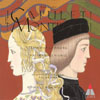Bellini I Capuleti e i Montecchi
Hei-Kyung Hong steals the show with her Giulietta; the other parts are weaker, but should you miss her star performance?
View record and artist detailsRecord and Artist Details
Composer or Director: Vincenzo Bellini
Genre:
Opera
Label: Teldec (Warner Classics)
Magazine Review Date: 2/2000
Media Format: CD or Download
Media Runtime: 0
Mastering:
DDD
Catalogue Number: 3984-21472-2

Tracks:
| Composition | Artist Credit |
|---|---|
| (I) Capuleti e i Montecchi |
Vincenzo Bellini, Composer
Donald Runnicles, Conductor Hei-Kyung Hong, Giulietta, Soprano Jennifer Larmore, Romeo, Mezzo soprano Paul Groves, Tebaldo, Tenor Raymond Aceto, Capellio, Bass Robert Lloyd, Lorenzo, Bass Scottish Chamber Chorus Scottish Chamber Orchestra Vincenzo Bellini, Composer |
Author: Alan Blyth
Bellini obviously loved his Giulietta. Every bar of her music evinces his empathy with her vulnerable, lovelorn being. It is a tribute to the greatly gifted Hong that she again and again makes that clear, nowhere more so than in her desperate cantilena in Act 2, 'Ah! non poss'io partire', the tone ideally plaintive and vibrant, the deeply felt expression ideally poised on an even line, the repeat even more touching. In solo and duet, the accomplished Korean soprano blends positively with her Romeo. This then is a performance for any lover of fine singing to savour with pleasure. Gruberova (EMI) is as moving but not so consistent vocally, Mei (RCA) almost but not quite in the Hong class.
Nothing else in the new set is quite as convincing. Larmore throws herself into Romeo's part with almost as much dramatic aplomb as Kasarova (RCA) and has more than a few moments of vocal distinction, but her tone is no longer quite as pleasing as it once was, an edge creeping in when it comes under pressure. Kasarova is even more youthfully ardent, Baltsa (EMI) perhaps the most convincingly male-sounding. That said, we would be happy with any of them, were the others away. They all convey, Larmore especially with her real sense of Bellinian style, the youth's intensity of feeling, especially in the Tomb scene.
Groves is an anonymous Tebaldo with a voice that sometimes takes unkindly to recording. Vargas (RCA) is much more pleasing, too much so for such a nasty character. Raffanti (EMI), with a truly Italianate tone and manner, projects Tebaldo's viciousness better than either rival. Lloyd, singing with the refinement and discernment we expect from him, is a properly avuncular Lorenzo, superior to both of his rivals. By contrast, the rough bass singing Capellio isn't in the class of either of his rivals, a serious blot on the performance.
Runnicles conducts a finely shaped, alternately lyrical and fiery reading more in the vein of Roberto Abbado than of Muti, who - in a live performance - is marginally to be preferred, but the opera-house recording hasn't the breadth of either of the studio-made sets. The Scottish Chamber Orchestra needs not fear comparison with its rivals. Where the Abbado version scores is in including, on a third CD for no extra price, the alternative Vaccai ending written at Malibran's behest. That probably just gives the RCA the advantage, but I would be loathe to forsake Hong's particularly affecting interpretation.'
Nothing else in the new set is quite as convincing. Larmore throws herself into Romeo's part with almost as much dramatic aplomb as Kasarova (RCA) and has more than a few moments of vocal distinction, but her tone is no longer quite as pleasing as it once was, an edge creeping in when it comes under pressure. Kasarova is even more youthfully ardent, Baltsa (EMI) perhaps the most convincingly male-sounding. That said, we would be happy with any of them, were the others away. They all convey, Larmore especially with her real sense of Bellinian style, the youth's intensity of feeling, especially in the Tomb scene.
Groves is an anonymous Tebaldo with a voice that sometimes takes unkindly to recording. Vargas (RCA) is much more pleasing, too much so for such a nasty character. Raffanti (EMI), with a truly Italianate tone and manner, projects Tebaldo's viciousness better than either rival. Lloyd, singing with the refinement and discernment we expect from him, is a properly avuncular Lorenzo, superior to both of his rivals. By contrast, the rough bass singing Capellio isn't in the class of either of his rivals, a serious blot on the performance.
Runnicles conducts a finely shaped, alternately lyrical and fiery reading more in the vein of Roberto Abbado than of Muti, who - in a live performance - is marginally to be preferred, but the opera-house recording hasn't the breadth of either of the studio-made sets. The Scottish Chamber Orchestra needs not fear comparison with its rivals. Where the Abbado version scores is in including, on a third CD for no extra price, the alternative Vaccai ending written at Malibran's behest. That probably just gives the RCA the advantage, but I would be loathe to forsake Hong's particularly affecting interpretation.'
Discover the world's largest classical music catalogue with Presto Music.

Gramophone Digital Club
- Digital Edition
- Digital Archive
- Reviews Database
- Full website access
From £8.75 / month
Subscribe
Gramophone Full Club
- Print Edition
- Digital Edition
- Digital Archive
- Reviews Database
- Full website access
From £11.00 / month
Subscribe
If you are a library, university or other organisation that would be interested in an institutional subscription to Gramophone please click here for further information.




